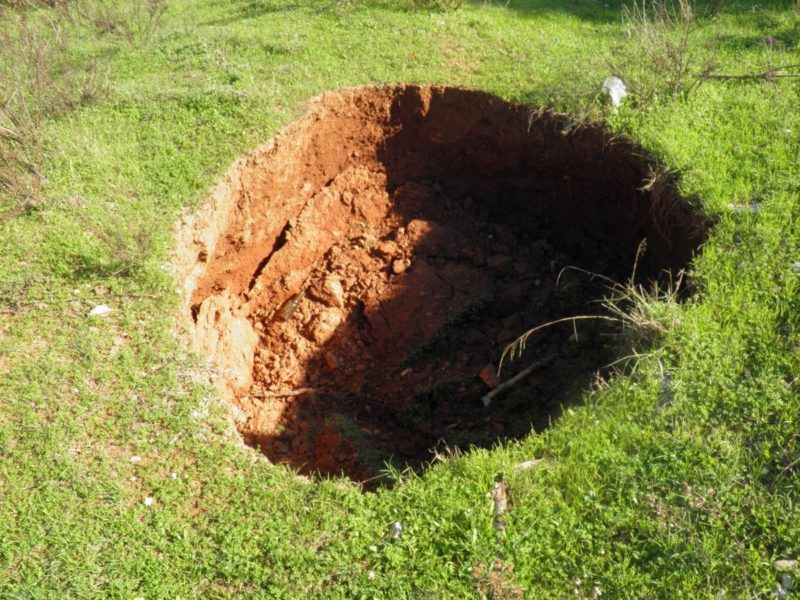Ever heard of and wondered how much does sinkhole insurance cost? Well, Sinkhole Insurances range from $2,000 to $4,000 per year, with the tendency to come with a high deductible starting from 1% to 10% of the policy dwelling limits.
But despite their costly price tags, you have to consider that about 20 percent of the entire U.S. land is susceptible to this natural disaster making sinkhole insurance claims reach an average payout of $140,000, so it’s easy to understand why they’re that expensive.

There are tons of major insurance companies that offer endorsements for sinkhole insurance within high-risk areas. So with places like Florida and Tennessee, where sinkholes are commonplace, you can relax knowing your properties have sinkhole insurance protection.
Cost of Sinkhole Insurance; 3 Benefits of Homeowners Insurance
Before we get into the nitty-gritty of Sinkhole Insurances, we should at least identify what sinkholes are. Simply put, sinkholes are deep submerged cavities within the ground. They come in three types: Collapse sinkholes, Subsidence sinkholes, and Clay shrinkage, each having different causes but overall can cause damage.
However, standard homeowners insurance doesn’t usually cover sinkhole, earthquake, or landslide-related property damages. And this is where sinkhole insurance comes in, a special endorsement that protects your home and any personal items from sinkhole damages that you can add to your policy.
Additionally, since parts of the U.S. are highly susceptible to sinkholes, some states require insurers to offer optional sinkhole coverage to their insurance policy for an additional cost or may be purchased separately as a stand-alone policy. So, with those in mind, how much does sinkhole insurance cost?
They have priced around $2,000 to $4,000 dollars annually. Sometimes they come with a high deductible equal to 1%, 2%, 5%, or 10% of the policy dwelling limits.
Although enormous sinkholes often make it to the headlines, smaller sinkholes are more prevalent and pose a nuisance to many establishment owners. Additionally, all property damages and losses caused by sinkholes are covered under said plan. Now with all this into consideration, it’s only natural to purchase a sinkhole insurance plan.
#1. Risk Transference
Insurance is a form of risk transference that ensures the burden of potential loss from unexpected outcomes a client faces is shifted to a willing third party in exchange for periodic payments. This is a common risk management strategy that helps individuals through third parties cover the expenses instead.
#2. Sinkhole Collapse Coverage
Sinkhole Insurance covers structural damage, including the foundation of a building caused by sinkhole activity. Furthermore, they also cover the expenses needed to replace personal belongings and apply preventive measures such as structural bracing.
#3. Catastrophic Ground Cover Insurance
Catastrophic Ground Cover Insurance is also available alongside sinkhole insurance, which covers a slightly different type of loss. And to activate this type of insurance, the damages must meet specific criteria before structural damages and rebuilding are covered.
Related Questions
Since sinkhole insurance could be hard to comprehend, here are some questions related to your quarry about how much does sinkhole insurance cost:
#1. Is sinkhole insurance worth it?
Sinkholes are unforeseen natural or man-made disasters, so that that sinkhole insurance can come at a costly rate. So it’s essential to balance the risk and your budget coverage. If you live in high-risk areas such as Florida, Tennessee, or Alabama, it is worth paying for the extra coverage and purchasing it at a lower price.
#2. Which companies offer sinkhole insurance?
Since sinkhole insurance isn’t a popular policy, it can be hard to find companies that offer such policy in low-risk areas compared to states like Florida who require all insurance companies to provide the optional offer of adding sinkhole insurance.
#3. What to do if I find a sinkhole in my property?
After identifying or finding signs of sinkholes in your area, it is a priority to immediately report it to your local authorities or law enforcers. It is also recommended to seal off your place to avoid liability claims and contact your insurance provider as soon as possible.
#4. How do I identify a sinkhole?
Sinkholes don’t appear right away and gradually develop that they can be unnoticeable. However, suppose you live in a sinkhole-prone area. In that case, it is essential to watch out for these signs: deep cracks within the pavement, sidewalks, and driveway, a circular depression in your area or yard, doors and windows that don’t open or close properly, and cracks forming around your doors and windows.
#5. What causes sinkholes?
Sinkholes are often natural disasters caused by the earth’s movement or when spaces and caverns develop underground due to dissolving rocks. They form very slowly until a collapse occurs. They can also be man-made caused by irresponsible mining.
Conclusion
How much does sinkhole insurance cost? Once again, sinkhole insurance is priced around $2,000 to $4,000 annually that can come with deductibles. If you live in high-risk areas where sinkholes are commonplace, it is worth adding sinkhole insurance into your homeowner’s insurance policy. Homeowners should be insured to safeguard their property and family, learn whose name goes on homeowners insurance and how to get homeowners insurance to pay for new siding to be knowledgable and to prepare for the future.
